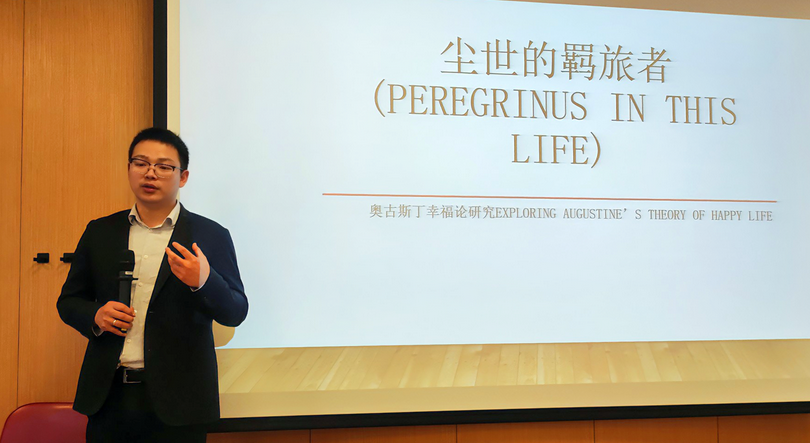On April 11, Associate Researcher Dr. He Teng from the School of Philosophy at Fudan University was invited to deliver a lecture titled "Peregrinus in This World: Exploring Augustine's Theory of Happiness" at the Divinity School of Chung Chi College, the Chinese University of Hong Kong.
Co-hosted by Professors Naomi Thurston and Yam Cheuk Yin, the lecture aimed to explore Augustine's perspective on happiness as a potential resource for reflection in contemporary times marked by a perceived lack of well-being.
To understand Augustine's contribution, Dr. He first situated his reflections within the rich context of ancient philosophical debates surrounding happiness, known as eudaimonia (Greek) or beata vita (Latin). He clarified that ancient thinkers generally conceived of happiness not merely as subjective feeling but as the objective flourishing of human potential, the ultimate "highest good" (Summum Bonum) pursued for its own sake, even as they proposed diverse paths—from the Stoics' emphasis on virtue alone to the Peripatetics' requirement for a mix of goods, the Epicureans' focus on tranquility, the Skeptics' valuation of the quest for truth, and the Neoplatonists' aim for divine union; crucially, philosophy then often demanded practical commitment as a committed "way of life" (askesis).
Into this established intellectual and practical landscape, Augustine introduced a distinctively Christian framework, drawing upon key texts like De Beata Vita (On the Happy Life), Contra Academicos (Against the Academicians), De Trinitate (On the Trinity), and especially Book 19 of De Civitate Dei (The City of God). Dr. He highlighted the core theological premises shaping Augustine's approach: the necessity of divine grace for attaining true happiness, the profound impact of original sin limiting human capabilities, and a decisive eschatological perspective positing that complete fulfillment is only realized in the life to come, prompting Augustine to reconcile classical insights with Christian doctrine and forge his unique synthesis.
A significant portion of the lecture detailed Augustine's systematic critique of attempts to secure ultimate happiness within the confines of earthly life, the saeculum. Dr. He explained how Augustine, particularly in The City of God, argued against grounding fulfillment in the satisfaction of natural desires or the possession of external goods, demonstrating their inherent instability due to life's unavoidable misfortunes (miseriae)—illness, accidents, loss—and the transient nature of worldly pleasures, concluding such foundations are fundamentally unreliable.
Augustine's critical analysis, Dr. He elaborated, extended even to the respected Stoic ideal that virtue alone suffices for happiness. While deeply valuing morality, Augustine contended that earthly virtue is insufficient for complete fulfillment because its very practice signifies an ongoing struggle against imperfection, it derives its goodness only from proper orientation towards God (the true Summum Bonum), it represents an incomplete form compared to perfect archetypal virtues, and it requires purification and elevation by the theological virtues of faith, hope, and love (fides, spes, caritas).
Furthermore, Augustine realistically assessed the limitations of achieving ultimate happiness through social and political harmony. Dr. He outlined Augustine's view that even the closest human relationships are subject to misunderstanding, civic justice is inevitably fallible, and broader human society is fragmented by conflict and division, meaning that while the social sphere is essential, it remains too marked by imperfection to provide ultimate solace or fulfillment.
This comprehensive critique of worldly foundations, Dr. He stressed, served not to induce despair but as a crucial diagnosis: the fundamental error identified by Augustine was seeking perfect completion within an inherently imperfect temporal world. Consequently, Augustine proposed a radical reorientation, arguing that true, lasting happiness must ultimately be sought beyond the confines of this life, in the eternal realm with God.
The constructive aspect of Augustine's vision, the speaker explained, centers on the increasing importance of love—specifically Caritas—in his mature thought as the key to navigating the path towards happiness. Moving beyond a purely intellectual "possessing God" (Habere Deum), Augustine emphasized an affective "clinging to God" (Adhaerere Deo), understanding this love as initiated by divine grace, relational, expansive (encompassing God and neighbor), and primary even over knowledge, thus grounding true community and making the path accessible to all.
This theological framework culminates in Augustine's enduring image of human beings in this world as peregrini—sojourners or pilgrims traveling in via ("on the way") towards their true celestial homeland. Dr. He articulated that while perfect happiness awaits in the afterlife—characterized by complete satisfaction, effortless virtue, and eternal peace (pax aeterna)—the present earthly journey gains profound meaning and purpose when lived through faith ("walking by faith, not by sight"), sustained by hope (spes) in God's promises, and actively guided by rightly ordered love (caritas).
In conclusion, Dr. He suggested that Augustine's perspective doesn't devalue our present existence but rather recasts it as a meaningful pilgrimage towards an eternal horizon. Augustine's genius, he suggested, lay in infusing the timeless human quest for happiness with the transformative power of Christian love (Caritas), thereby offering enduring hope for navigating life's inherent struggles. This vision resonates powerfully in the image of the peregrinus – the sojourner – portraying us as travelers on a path, sometimes arduous, yet with hearts set firmly on a distant homeland, carried onward by the uplifting force of love and hope toward that ultimate destination.












